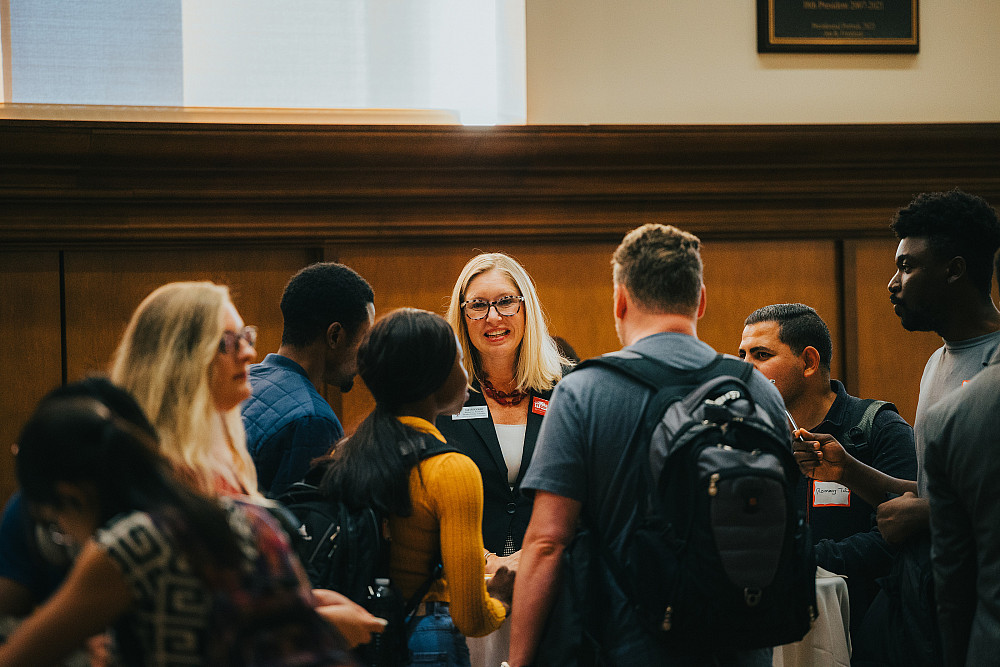Q&A with assistant vice provost for enrollment management and executive director of retention
By IU Bloomington Today
February 08, 2024

Question: How does your retention role support the goals of OEM and IU?
Answer: Student success is at the core of both the campus — as is evidenced by the Student Success Pillar in the IUB 2030 Strategic Plan — and the Office of Enrollment Management. OEM works with students throughout their entire IU journey, from being a prospective student considering IU through graduation. Whether going through the admission process, registering for classes, applying for scholarships and financial aid, navigating the first-year experience, or going to Student Central for assistance, each interaction our staff has with a student is a retention opportunity.
This position was created to have someone in OEM who wakes up every morning thinking about helping students stay enrolled and on their path to graduation, and to ensure that all our work is done through a retention and student success lens. I work with OEM units on implementing strategic initiatives and opportunities to increase a student’s likelihood of staying enrolled and removing unnecessary barriers or roadblocks in enrollment processes.
I also work closely with partners across campus, such as colleagues in undergraduate education, Office of Student Life, scholarship and support programs, and the schools and College of Arts and Sciences, on ways we can collaborate in the student success space to enhance our collective efforts and identify and eliminate equity gaps.
Q: As you approach the second full year in this role, what are some key takeaways you’ve learned?
A: We are not just recruiting students to IU; we are recruiting future graduates. OEM and the campus have done, and continue to do, a lot of good work in the recruitment and first-year-experience spaces, which is absolutely essential for students to have a successful transition and start to their IU career.
However, we must remember that the majority of enrolled students on campus are continuing students. Our goal is to actively re-recruit them each year and provide them with the resources and support they need to thrive. We must work collectively to meet the enrollment promise of supporting and serving our students in robust and meaningful ways throughout their time at IU.
While visiting with students at a recent first-generation student event, I heard firsthand about the specific obstacles that first-generation students face, but also saw the excitement and pride they felt at how much they had already accomplished. As I talk with students and campus partners, I continue to get a deeper understanding of the challenges students face, the ways they find success, and the fact that each experience is completely unique.
Q: What are some efforts currently underway in OEM to help with retention?
A: We need to better understand not just who leaves IU, but why they leave. Working with a campus-wide committee, and in partnership with Eduventures Research and Advisory Services, we are conducting a two-phase campus student success and retention survey.
This spring, we are launching the first phase to students who enrolled at IU in the fall of 2021, 2022 and 2023 and are no longer enrolled. Next spring, we will administer the second phase: a survey to the 2024 beginner cohort while they are enrolled. The combined data from both surveys will give us greater insights into why students leave, but also the ability to predict retention likelihood for students in the beginner cohort, with the opportunity to address any challenges or concerns before the end of their first year.
We have identified a population of students in the beginner class who are persisting at rates below their peers and don’t have the benefit of being in one of IU’s targeted support programs, such as Groups Scholars, the Hudson and Holland Scholars Program or the 21st Century Scholars Program. We know that students who participate in these programs have higher retention and graduation rates than their peers. While a long-term solution will require more analysis and planning, we took immediate steps to provide some additional resources to students not in a support program, with a targeted ad campaign, ramped-up efforts to connect students with peer mentoring, and additional programming through the Office of First Year Experience Programs.
Throughout the summer and early fall, we held focus groups to better understand the “pain points” for students that may contribute to them leaving IU. Those conversations helped build a digital campaign for social media that included strategic messaging reminding students of key enrollment deadlines, recommending they meet with their academic advisor and connecting them with resources. The ads had more than 200,000 impressions and more than 250 clicks, with the highest number for the academic advising content. The campaign will continue this spring, timed to align with when first-year students register for fall courses.
OEM currently utilizes AI technology for chatbot systems. We are working with Student Central to explore opportunities to expand that use to proactively reach out to students via SMS rather than wait for those who are having trouble initiating contact.
The data that we gather from the surveys and the conversations and activities we’re engaged in within OEM and collaboratively across campus will provide valuable information to those working in the retention and student success space — which is all of us.